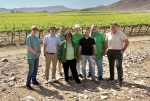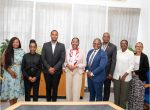Andrada Mining Limited, an African technology metals mining company with a portfolio of mining and exploration assets in Namibia, has announced commencement of an initial exploration programme for the Brandberg West exploration licence which it believes will solidify Andrada’s tech-metals portfolio by potentially adding critical metals revenue streams of tungsten, and copper as a by-product.
Namibian exploration license EPL5445 is located 110km west of the Uis Mine (ML134) within the mineral rich Erongo region of Namibia. The license covers an area of 35 045 ha and includes the Brandberg West mine which was owned and operated by the mining entity Gold Fields until closure in 1980. Historical reports indicate that over 12 000 tonnes of tin and tungsten concentrate were produced during the mine’s life, with peak production recorded at 1 249 tonnes in 1978.
Anthony Viljoen, Chief Executive Officer, commented: “The exploration programme will enable us to determine the extent of the mineralisation in and around the Brandberg West mine. The project provides an exciting opportunity for us to duplicate the development process we have successfully implemented at Uis, by taking it from an abandoned historical operation, into a fully-fledged producing mine.
“The historical figures show that EPL5445 has the potential to double the current volume of tin concentrate produced at Uis and add Tungsten to the expanding list of metals produced by Andrada. The Erongo region continues to prove itself to be an untapped technology metals province, and we are excited to be commencing work on what we believe will be another world class technology metals asset.
“We look forward to continuing with our exploration programme and aimed at re-establishing the historical Brandberg West Mine.”
Brandberg West is currently the only Namibian exploration licence within the Company’s portfolio. The project was acquired for its significant tin and tungsten mineralisation in line with the Company’s vision to become a tier-one multi-tech-metal producer. The license has multiple documented mineral occurrences that indicate the presence of a large-scale mineral system including known concentrations of tin, tungsten, and copper.
The potential production of tungsten will expand the number of technology metals within the Company’s portfolio. Copper mineralisation has also been documented within the mineralised area and will be investigated as a potential by-product. The license area lies within the Southern Kaoko Zone, a division of the Damara Orogen.
The lithological units within the license area comprise a sequence of metamorphosed sedimentary layers folded along a NNE-SSW trend. Multiple generations of quartz veins have been identified within these metasediments, with one or more of these generations being associated with hydrothermal tin, tungsten, and copper mineralisation.
“Tungsten is highly resistant to corrosion, has a very high melting point and the highest tensile strength of any element. Current uses include electrodes, heating elements, and filaments in light bulbs. It is also commonly used in heavy metal alloys such as specialised steels from which, for example, cutting tools are manufactured. Copper is a key input in the production of electric vehicles constituting up to 25%¹ of the requisite metal content. Electric vehicles contain approximately 1.5 km of copper wiring used to convert the electrical energy to mechanical energy,” the miner said.
A dual phased approach is planned for the development of the Brandberg West licence area. The initial phase will investigate the historical mining area and potential extensions of the mineralisation along strike, with the northern extension identified as a priority due to the abundance of mineralised veins visible at surface. This initial phase will also include evaluation of high-grade mineralisation in the historical pit through a detailed drilling programme. ]
“The mobilisation of a drilling programme comprising 3 000 metres will commence during the second half of this calendar year and further updates will be provided as results are obtained. The second phase entails investigation of the mineralisation potential of the wider license area. Essentially, this programme will investigate multiple occurrences of mineralisation through sampling and geological mapping to establish potential enrichment trends,” added the company.










